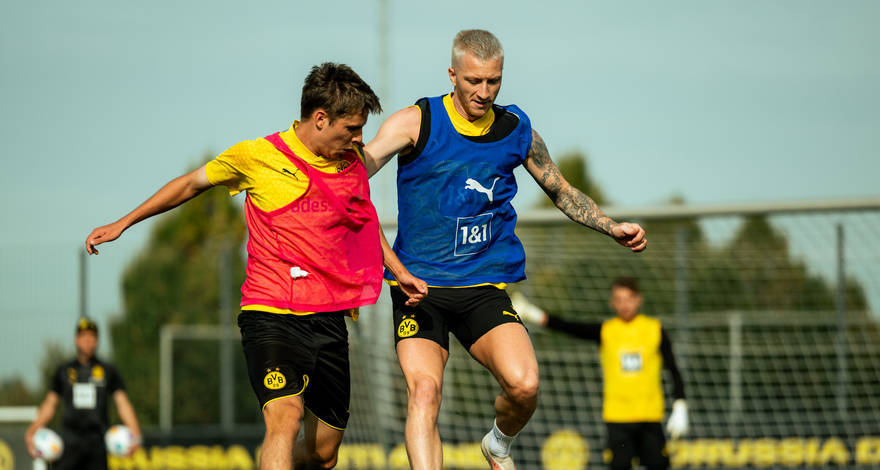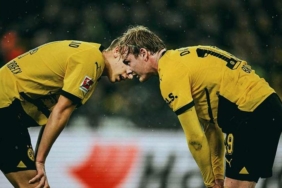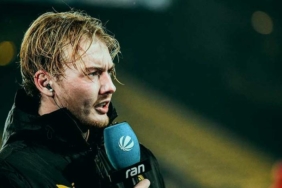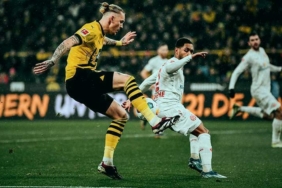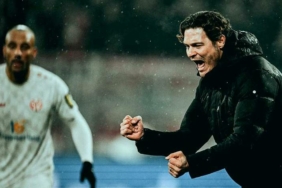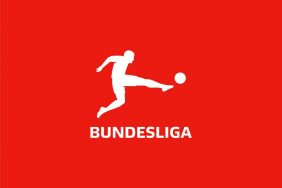Developing a winning mentality, dealing with more pressure, not capitulating in the face of setbacks – these are the guidelines set for the U19s. However, it is not all about a footballing education – a school education is also a priority. Director of the youth performance centre Lars Ricken and coach Mike Tullberg take responsibility for both of these aspects. Three U19s players talk about themselves and their inspirations. Each of them has their own story and they have all taken very different paths. They are living out their dreams with a healthy dose of realism.
When Lars Ricken, director of the BVB youth performance centre, is negotiating contracts with players and their advisers or discussing career plans, other clubs are always essentially sitting at the table in some respects. “The situation we are in is an international competition,” says Ricken. There has been a lot of talk about how much talent there is bubbling under the surface in Borussia’s U19s, and the procession of scouts from all over Germany and abroad that regularly make a pilgrimage to the UEFA Youth League matches is as long as you might expect. Last season’s five home matches alone were attended by some 260 scouts, who reported to their clubs how many highly-talented young footballers they spotted in BVB Black and Yellow.

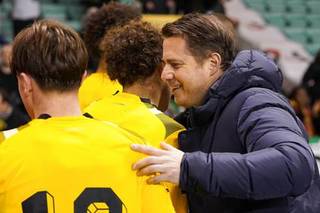
“All of our players know them,” says Ricken, “the general conditions have turned completely on their head over the past few years.” What sounds like a deep sigh from his mouth on the one hand, is a confirmation of the brilliant work that is being done in Dortmund’s youth research department on the other hand. Four BVB representatives have just returned from Budapest as the newly crowned European U17s champions, and if Luke Rahmann had not suffered a serious injury last year, it would probably have been five BVB youngsters standing under a golden rain of confetti at the trophy presentation ceremony. “We are coaching top players here right now,” Ricken emphasises. The German U17s championship (where BVB only managed fifth place in the west) was not a benchmark for this, assures the academy boss, ensuring us “there were reasons for that”.
But back to the U19s, who are currently made up of the best players born in 2005 and 2006 and are to be the next generation of hopeful footballers to be given all the tools they need for professional football. 26 games in the A-Junioren Bundesliga West, ideally followed by three more in the play-offs for the German Championship, plus at least six fixtures in the Youth League are the acid test in which the particularly talented youngsters are to develop the steel they need for the transition to the men’s game. How they assert themselves at this stage of their footballing education can significantly influence their subsequent career path. Do they go straight into the first team squad like Youssoufa Moukoko, Jamie Bynoe-Gittens, Christian Pulisic or Mario Götze before them, to name just a few examples? Do they make an intermediate step up to the U23s in the 3. Liga? Or will they perhaps try their luck in another club like Luca Kilian (Cologne), Ansgar Knauff (Frankfurt) or currently – and only on a temporary basis – Tom Rothe (Holstein Kiel)?
This would take them on a path many before them have taken as they headed out to every corner of Germany. No other club has brought through as many players in the current squads of the top three leagues in Germany as Dortmund have, where the promotion of talented youngsters is particularly important. “The U19s,” Ricken emphasises, “are extremely important for the club’s overall strategy.” Developing a winning mentality, dealing with higher pressure, not capitulating in face of setbacks – that is what counts in a highly ambitious sporting environment for the BVB trophy-winning machine (nine German championships, seven west German championships).

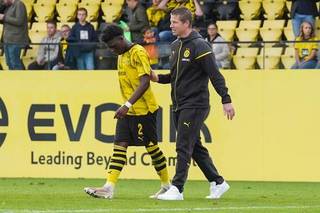
As head coach, Mike Tullberg sets the course for the U19s. Since 2020, the Dane, who lives in Essen, has been the chief trainer of the oldest academy players. The club and the football coach have agreed to extend their collaboration for three more years. In Tullberg, BVB have a specialist who defines the scope of his educational mandate far beyond the pitch. Together with his dedicated team, he also expressly assumes responsibility for “how our players develop as people.” Accordingly, he attaches great importance to proper conduct, to discipline, and above all to showing respect to all the people the young footballers come across. “It is important to give them values,” emphasises Tullberg, “they should remain human.” In this sense, the father of three children is charge of much more than a talent assembly line at Borussia, in which his students learn to recite any given tactical system from back to front – it is more of a school for life.
In his dual role as a coach and educator, Tullberg follows clear guidelines. He describes himself as “very emotional and very energetic.” His credo: “I want to achieve everything possible.” No more and no less is what he demands from his players, who he can forgive for any mistakes and crises of form, should they arise. What he is not willing to accept, however, is if they put in even one percent less than their all, day in, day out: “When the day comes that they leave us, they should be able to look at themselves in the mirror and say that they have done their all every day to become the best possible they can be as a player and as a human.” He watches his team like a hawk to make sure they heed that key message. If they fail to show the necessary seriousness during training, they will gets to know the stricter side of their coach. Tullberg will not hesitate to order a few laps around the training ground. “If they don’t want to get better, at least they will get fitter,” he says with a chuckle.

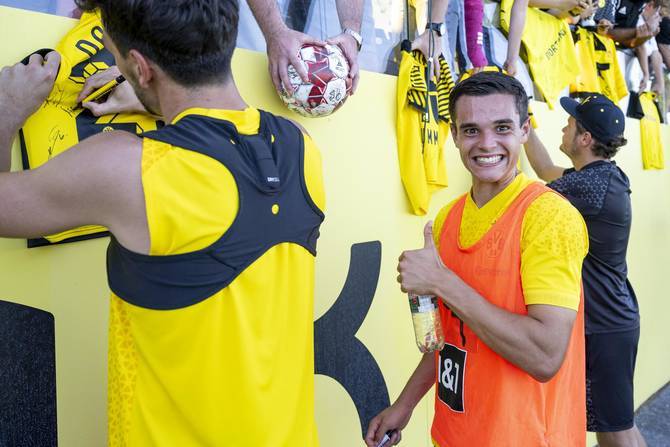
Tullberg also showed his players a video about two young footballers did not manage to make it to the top, to raise their awareness of the need to always push themselves to the limit even outside the training ground. The main protagonists of the film had realised their personal shortcomings too late and had to wave goodbye to their soaring expectations and dreams. “My lads shouldn’t get into the situation of having to say to themselves at some point: ‘If only I had done more back then’,” says Tullberg. “You should do everything you can to make it happen now.” Because sport (like life) is not fair and can sometimes be painful. He provokes resistance to this during training, and encourages his boys to come up with ways to rise up against it. And with some success – as last season showed! Only one point was a meagre return from the first three games in the UEFA Youth League until a remarkable effort and sprint to the finish line brought the Dortmund youngsters into the last 16 – and later to the quarter-finals.
The latest batch of U19s have also made it a key objective to make it through the group phase in this year’s competition. In a lively round of discussions at the BVB sports office, three aspiring young talents talked about their personal perspectives and plans:
• Kjell Wätjen, 17, a midfielder with “plenty of potential”, who is already remarkably mature for his age, as Lars Ricken notes.
• Jaden Korzynietz, 18, a versatile defender, who seems like he was blessed with talent as a baby.
• Danylo Krevsun, 18, a midfielder with a truly extraordinary story: the Ukrainian fled to Dortmund with his mother before the Russian invasion and immediately made a big impression with Preußen Münster before going on to really shine for BVB since February 2023.
KJELL, you have already racked up some assists this season. Which central midfielders in the history of BVB inspired you the most in this respect?

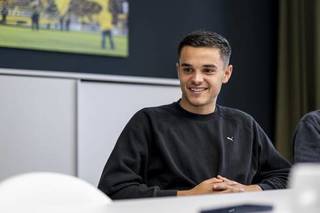
In the club’s history? That’s a tough one. But last season, definitely Jude Bellingham. His style of play was one of the decisive factors in the success of the team. When I was young, I loved watching Mesut Özil and Kevin de Bruyne, even though they played (or still play) further up the pitch than I did. They could play the last pass, or the key one before that, they could shoot. They have always fascinated me.
In international breaks, you occasionally train with the first team. What do you take away from those sessions?
The experienced players help me and give me tips. In terms of positioning, for example. Or what to do first when I get the ball. In general, I can see in these sessions that I still have a lot of room for improvement when it comes to physicality and athleticism.
As one of Dortmund’s four European U17s champions, you were honoured before the match against Cologne in front of more than 80,000 fans. How did that feel in such an atmosphere?
That was something special in front of so many people who were happy and applauding because young German footballers have won something again. Standing in front of the South stand gives you so much confidence.
Did you have more than a vague idea of becoming a professional footballer when you were 10 or 11?
Everyone dreamed of being a professional footballer. But it was only the fun and joy of playing football that brought me to where I am. In the beginning, it was all about playing good football and having fun.
And when did your plans for your later life really start to lean in the direction of professional football?
The older you get, the more you think: ‘Where can this take me?’ At some point, school is over. And when you move out of your parents’ home, you have to make money. I would like to do that as a footballer.
What is different in the Youth League than facing Leverkusen, Schalke or Cologne in the U19 Bundesliga West?
The best of the best play in the Youth League. And they play a completely different style of football. Paris Saint-Germain have plenty of extremely talented individuals, Milan impressed with their physical strength and robustness – and played very cleverly.
JADEN, you are known for having an exceptionally high football IQ. Did your father Bernd – an ex-pro who played for Mönchengladbach, Bielefeld, Wolfsburg and Duisburg – make sure that you were playing with a ball and not the Playstation as a child?

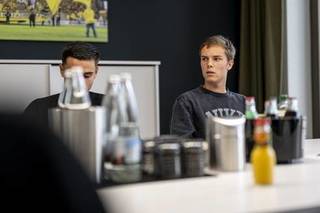
No (laughs). As a child, I was able to decide for myself what I did. I followed my own interests at an early age and developed a passion for football. Of course, our family were really into football, but I was not pushed in that direction.
Is your father an important adviser to you today?
Absolutely. As far as football is concerned, he is my role model – and the first person I talk to. When his job allows it, he watches the games. But first and foremost, it’s not to give me tips, it’s just as a father, supporting his son.
In your career to date, you have played as a left-back, right-back and defensive midfielder. Does that versatility increase your chances of a professional career?
Of course, it is an advantage to be able to play in multiple positions. I certainly benefit from that, and can learn a lot from being used in different positions.
Like Kjell Wätjen, you have been at Borussia Dortmund for some time – since 2015. Are you looking to compete with Michael Zorc and Lars Ricken when it comes to club loyalty?
I chose BVB because I felt most comfortable here. Nothing has changed in that regard. I am playing in my ninth season for Dortmund and have never felt out of place. I still find it great here.
DANYLO, your mother Yuliya was an excellent 800 m runner, competing at the Beijing Olympics in 2008 and finishing fourth in the 2009 World Championships in Berlin. That might explain why you run 12-13 kilometres in each game. Could you have been successful as a track and field athlete?
That was never on the cards. My father was a boxer, but my interest was always football. I never ran with my mother either. I love football.

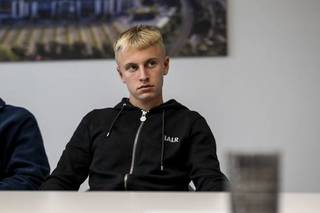
How have you fitted in so incredibly well in just a few months?
The team have played a big role in that. Everyone helps me and supports me. If we cannot communicate in German, we will try to do it in English.
You are particularly highly valued for your mentality and team spirit. Were those factors particularly emphasised in your footballing education at Shaktar Donetsk?
That comes from my mother. She was an athlete. I learned from her how important it is to have a good mentality.
Ten years ago, BVB played in the Champions League in Donetsk. Did you already know Borussia when you were just eight years old?
Of course, but I was not in the stadium at the time.
Is it all about having patience during the transitional phase between youth football and the men’s game?
That’s a key factor. Talent alone is not enough. You have to work hard to get into the first team. And you need a passion for football. It is a rocky road, and hard. Only the best will make it in the end.
The war in Ukraine is what brought you to Germany. Will you return to your homeland when the war ends? Then I will go home – to finally reunite with my father, whom I have not seen for 20 months. We are currently only able to keep in touch through daily video calls. I could visit him, but then I would not be allowed to go back to Dortmund.
And what are your plans for your career on the pitch?
In terms of football, I see my future here.
In the one-hour interview, it is clear that the talented youngsters at BVB are living out their dreams with a healthy dose of realism. They know that the months and years ahead of them will not be a walk in the park. As Kjell Wätjen suspects, they will have to learn to be perseverant. Jaden Korzynietz already knows all about how setbacks feel. After a syndesmotic ankle sprain, it was not easy for him to complete his rehabilitation. Seeing the other boys train and not being able to be out on the pitch himself hurt him. But still, he “made the best use of the time to come back stronger”. Jaden spent a lot of time in the gym in that period.
With the exception of Danylo Krevsun, who is already “finished”, as he reveals, school represents a key part of the players’ dual training system. For Kjell Wätjen and Jaden Korzynietz, the Abitur exams will be held in Dortmund and Bochum in just six months. “In football, anything can happen and get in the way of your career at any time,” says Kjell, “which is why I place a lot of emphasis on a good school education.” Jaden also accepts that he will need to put in the extra hours on this. Only recently, during the holidays, he had to re-sit a mathematics exam lasting several hours, because he was in Paris with the U19s when the test was originally scheduled. But it is not something you will hear him complaining about: “I made a conscious decision to do the Abitur. If that means dealing with a little more stress than the others, that’s OK.”
Mike Tullberg has set the team’s primary objective as winning the West German Championship. “That,” he stresses, “is the trophy that goes to the most deserving team.” He would also like to raise the youth DFB-Pokal one day, but that dream was very short-lived this season after a bitter 6-0 thrashing in Hoffenheim in the first round. Worse still: Borussia Dortmund have never won that trophy. “We long for that,” groans academy boss Lars Ricken, but somehow it doesn’t seem to be our competition. Why is that? “Maybe it’s me,” Ricken says with a wink. “As a player, I won many titles – but I never came close to the DFB-Pokal…”

